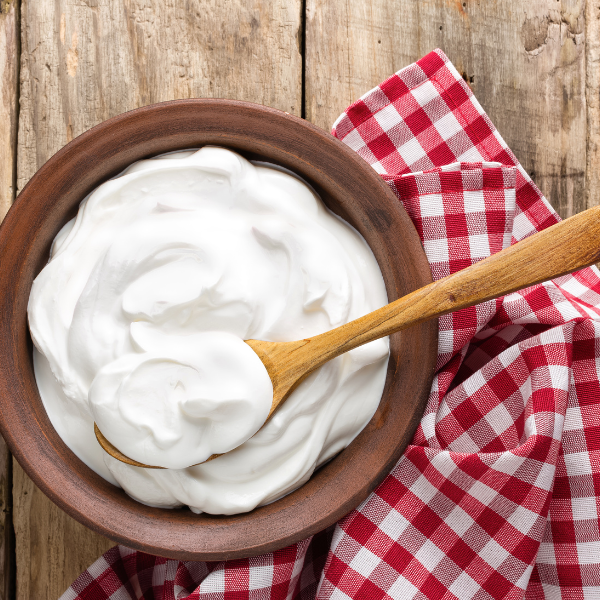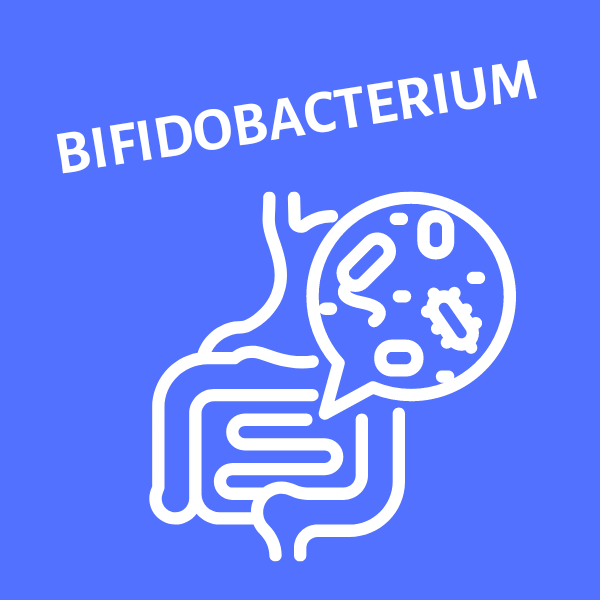This article was updated on 01-23-24.
Just a reminder that content on this blog is meant for information only and not intended as medical advice. Any changes made to your current course of treatment should always be discussed with your doctor, dietician/nutrition specialist, or GI specialist. Read full disclaimer here.
What Is Bifidobacteria?
Bifidobacteia belongs to the lactic acid bacteria group and live in the intestines.
What Are Other Names for Bifidobacteria?
Bifidobacterium is listed under many names including: B. Bifidum, B. Breve, B. Infantis, B. lactis, B. Longum, Bifido, Bifido Bacterium Longum, Bifidobacterias, Bifidobactérie, Bifidobactéries, Bifidobacterium, Bifidobacterium adolescentis; Bifidobacterium animalis, Bifidobacterium bifidum; Bifidobacterium breve; Bifidobacterium infantis; Bifidobacterium lactis; Bifidobacterium longum, Bifidum, Bifidus, Bifidus Brevis, Bifidus Infantis, Bifidus Longum, Bifidobacteria Bifidus, Lactobacillus Bifidus, L. Bifidus, Probiotic, Probiotique.
Common benefits of Bifidobacterium
Bifidobacterium is generally thought of as a good bacterium for healthy individuals. The current recommendations for avoidance are people with compromised immune systems such as those with HIV, AIDS, or cancer. It should also be avoided by women who are breastfeeding and taken under supervision for a limited time while pregnant.
Bifidobacterium has shown to be beneficial while treating (not necessarily as the only treatment for):
- H. pylori
- Irritable Bowel Syndrome (IBS)
- Constipation
- Ulcerative Colitis
- Crohn’s Disease
- Restoration of gut bacteria after chemotherapy or antibiotics
- Pouchitis (a complication of colitis surgery

Why is Bifidobacterium Avoided on the Specific Carbohydrate Diet™?
While Bifidobacterium is only mentioned as a bacterium to avoid when making yogurt in Breaking the Vicious Cycle, Gottschall indicated that it should be avoided in other discussions about the Specific Carbohydrate Diet™ (SCD™). Gottschall refers to a 1995 study (https://journals.asm.org/doi/pdf/10.1128/aem.61.9.3202-3207.1995) indicating Bifidobacterium longum and angulatum are associated with a high risk of colon cancer and that there are higher levels of Bifidobacterium in groups who are at a higher risk for colon cancer. The conclusion was that Bifidobacterium has a tendency towards overgrowth and could increase the risk of colon cancer in people with IBD.
Therefore, Gottschall recommended that Bifidus be avoided for the Specific Carbohydrate Diet™ because of a tendency to overgrow possibly creating more microbiome dysbiosis.
At the time of that 1995 study the relationship between increased levels of Bifidobacterium and colon cancer or colitis wasn’t entirely known. Was it the Bifidobacterium itself causing the problem or was the increased levels a result of one of those conditions?
In the nearly 30 years since that study was published, the research on this relationship between different types of bacteria on digestive health has continued.
UPDATE 01-23-24:
I was able to find this old conversation with Elaine.
She is referring to a book written by a University of Wisconsin professor. The book states:
“The greatest number of bacteria are found in the lower intestinal tract, specifically the colon and the most prevalent bacteria are the Bacteroides, a group of Gram-negative, anaerobic, non-sporeforming bacteria. They have been implicated in the initiation of colitis and colon cancer. Bifidobacterium bifidum is the Gram-positive counterpart to the Bacteroides in the colon. They are anaerobic, non-sporeforming, lactic acid bacteria. They are the “friendly” bacteria in the intestine. Bacteroides predominate in the intestine of meat-eaters, bifidobacteria and other lactic acid bacteria predominate in the intestine of vegetarians.”
This basically does say that bifidus is a friendly bacteria and is the gram-positive counterpart to to the gram-negative Bacteroides.
Elaine’s response to this was, “That said, it appears that bifidis could replace bacteroides and the implication of the latter in initiating cancer and colitis could be overcome. However, that is not certain and considering that our paleolithic diet was high in meat, I would doubt if meat is the real suspicious element in the diet. The research has indicated to me that any work done to support this thesis was not done without many other variables in the diet including high starch.” She then goes on to cite the 1995 study I referenced above.
There are a couple of things here. Yes, she is right, the study likely did not have enough variables to be conclusive. That is a common, and frustrating, factor about nutritional studies. However, we do now know there is a correlation between meat and colon cancer. We also now know that Bifidobacterium has anti-cancer properties that have been effective in the treatment of colon cancer.
Another things is, the Paleolithic diet was varied. Meat was not always available and people subsisted substantially on plant life. The meat early humans ate was not the same as we have now. Fish and small wild game would have been a bigger part of the diet than large, hard to kill animals, like deer or bison type animals. Their meat would also not be manipulated by hormones, antibiotics, or food the animal wouldn’t normally eat in the wild.
I do not say these things to discredit, nor criticize, Elaine Gottschall. I truly believe she would have likely updated her opinion of this if she had the information.
Does Bifidobacterium increase the risk for colon cancer?
As of this writing, there doesn’t not seem to be a causation between Bifidobacterium and colon cancer. In a study published July 2020 (https://www.ncbi.nlm.nih.gov/pmc/articles/PMC7400428/) it is indicated, “That the presence of Bifidobacterium lactis in a pro-inflammatory stimulated cell line decreased activity of the NF-κB. In the murine model of cancer, the presence of Bifidobacterium lactis was related to the decreased activity of the NF-κB and the improvement of the clinical picture (with lower number and size of tumors in comparison to the mice group with cancer, but not supplemented with Bifidobacterium)”
This 2019 study (Bifidobacterium animalis subspecies lactis engineered to produce mycosporin-like amino acids in colorectal cancer prevention – PMC (nih.gov) indicates, “Bifidobacteria are the main source of butyrate production, and butyrate has potent anti-inflammatory and anti-tumor effects.”
Does Bifidobacterium exacerbate Inflammatory Bowel Disease?
As mentioned in the previous section on colon cancer, current studies show Bifidobacterium has anti-inflammatory properties and is frequently used in treatment for Inflammatory Bowel Disease (IBD). In this 2020 study researchers find,
“The beneficial effect of Bifidobacterium infantis on the reduction of colitis induced by TNBS (2,4,6-trinitrobenzene sulfonic acid). Among the group of rats with colitis and supplemented with Bifidobacterium infantis, researchers noted a reduction in symptoms, weaker damage to the mucosal architecture, which indicated the protective meaning of probiotics for mucus goblet cells and the epithelial cell layer. In the murine model of TNBS colitis, oral supplementation with Bifidobacterium bifidum reduced the course of the disease on issues of colonic edema, macroscopic damage, histological scores, and additionally seemed to prevent weight-loss [76,77]. Based on another research group, supplementation with Bifidobacterium bifidum significantly increased the level of IL-10 and reduced the level of IL-1β in the colon sections, which confirmed the anti-inflammatory effect [77]. Those findings seem to confirm that Bifidobacterium infantis and Bifidobacterium bifidum have modulatory properties and reduce the inflammation as well as the clinical symptoms of colitis.”
Jakubczyk D, Leszczyńska K, Górska S. The Effectiveness of Probiotics in the Treatment of Inflammatory Bowel Disease (IBD)—A Critical Review. Nutrients. 2020; 12(7):1973. https://doi.org/10.3390/nu12071973
Current studies seem to show Bifidobacterium to be a benefit to some IBD patients. Of course, it should be noted that study focused on mice. Another thing to note is that different probiotics will have different effects on different people.

Why I use a yogurt starter that has Bifidobacterium
My purpose in this article is to provide some new information about Bifidobacterium given the continued studies of its relationship to IBD and the digestive tract, not to suggest anyone use it. That is a decision that individuals with IBD should discuss with their own medical professional if they are questioning whether it will be good for them or not.
For me, I determined that Bifidobacterium would be a good addition to my diet as a balanced microbiome should have a healthy level of it. I also was reasonably sure it wouldn’t have a negative effect on me since in my early days of SCD™ yogurt making, I wasn’t aware Bifidus wasn’t allowed. This wasn’t clear in my edition of Breaking the Vicious Cycle (1999) and I wasn’t as involved with online forums at the time. So, I had been making my yogurt with commercial starter for many years before I found that out.
I hope to see more studies about Bifidobacterium and IBD as time goes on.
- Peanut Butter Bliss Bites – No Refined Sugar - March 29, 2024
- Grain-Free Carrot Cake with Creamy Cashew Frosting - March 24, 2024
- Grain-Free Honey Almond Flour Muffins - February 20, 2024
